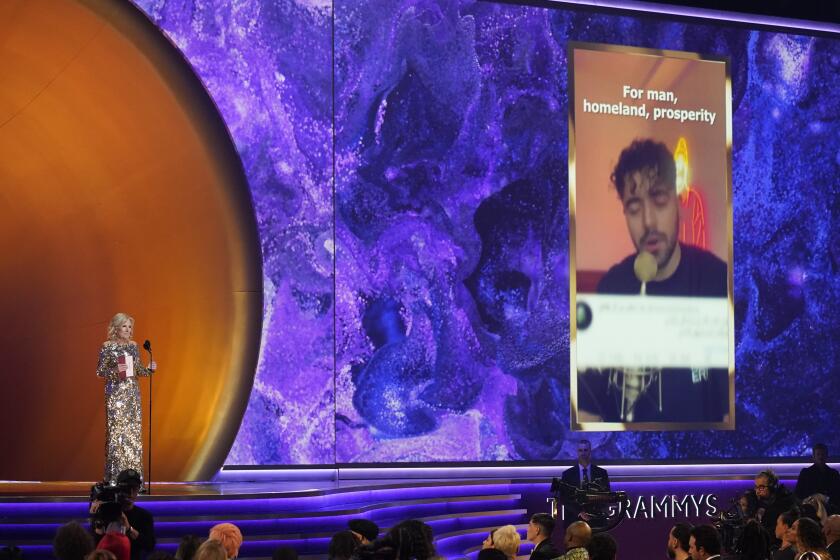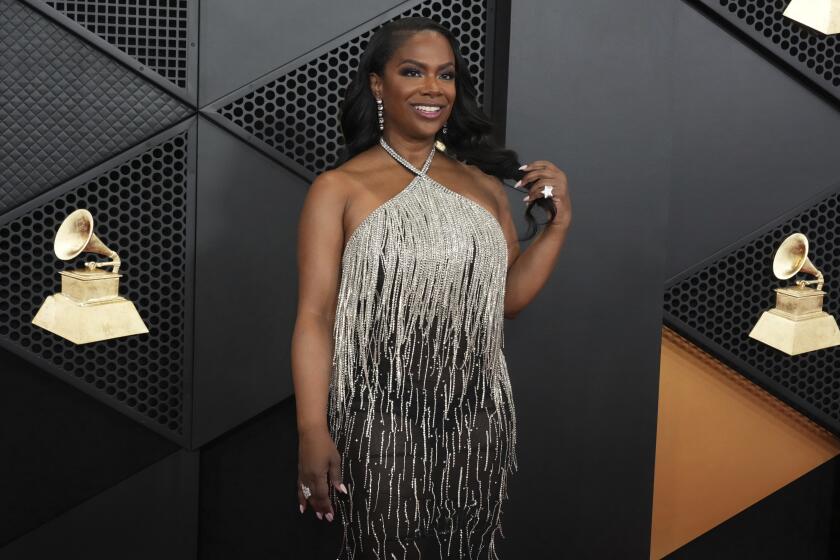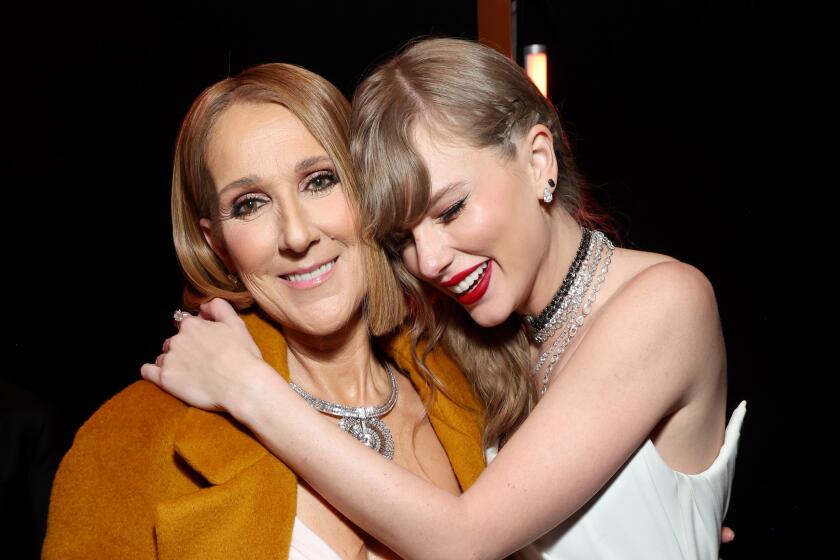Sara Bareilles finds her focus — finally
Sara Bareilles’ opinions tend to reveal themselves in song. Her first hit evidenced just that: Though thinly veiled, “Love Song” was about the disdain she felt toward record label executives who insisted she deliver a commercial radio single.
“I’m not gonna write you a love song ‘cause you asked for it, ‘cause you need one,” she sang defiantly on the 2007 track, which went on to earn two Grammy nominations and land at the top of Billboard’s Pop 100 chart.
“Yeah, it was ironic that it ended up working out,” she said last month, smiling as she sat outside at the French Market Cafe in Venice a few blocks from her house. “But I love being able to feel like I received a message from that, which is: Whatever success I may have is not going to come from a place where I’m trying to fit a mold. It’s going to have to come from an authentic place.”
But finding that zone — the one where she’s pleasing herself but still satisfying the expectations of her label and fans — has, it seems, been the perennial struggle for Bareilles. Her second major label release, “Kaleidoscope Heart” — which was released Tuesday and quickly became the No. 1-selling album on iTunes — didn’t come easily. In fact, after coming off nearly three years on the road to promote her first record “Little Voice,” the last thing she wanted to do was write music.
So she spent a couple of months searching for her first home, finally settling upon a shabby chic bungalow near Abbot Kinney Boulevard. She took yoga classes, had dinner with friends, went on a trip to Spain. Gradually she started to feel the weight of her time off, which was becoming somewhat considerable.
“It was such a long time between that record and this record,” said Bareilles, 30. “Three years — and nowadays, everyone’s attention span is so short, you feel like you’ve gotta get it out immediately. I definitely felt a sense of fear that I was falling behind because there were people that released records around the same time that I did, like Colbie Caillat and Ingrid Michaelson, and they both came out with their records in February. And I remember being like, ‘I don’t have anything to put out.’ ”
Inexplicably, the process had become more difficult. She wasn’t liking most of the songs she was writing.
“There’d be a sense of, ‘Oh, I have no desire to play that again,’ or I’d listen to a song for a while and I’d be like, ‘What am I even saying? Those words don’t mean anything to me,’ ” she said. “And that was my big fear with this record — that I wasn’t going to care about this music.”
Still, time was passing, and her manager kept prodding her to go into the studio.
At his urging, Bareilles picked four songs she felt OK about and began to record. Hearing the music come to life reinvigorated her creatively — but she was still grappling with the idea of how it would be received.
“That was the big challenge for me, was to try to break through the compare and contrast game and not worry about everyone else’s expectations,” she said, rubbing her nose, which is pierced by a small stud. “It feels like such an honor and a blessing to have had success with the first record, but at the same time, it comes with a sense of pressure that you have to surpass what’s already come before you. It’s tough to be competing against yourself.”
Even Neal Avron, who produced “Kaleidoscope Heart,” admitted he felt the pressure.
“Since it’s such a hit-driven market, as a producer, I have to make sure I can deliver on that front,” he said. “But Sara writes pop songs — she wrote ‘Love Song’ — so it’s not like you’re turning an orange into an apple.”
That doesn’t seem to be the way Bareilles views herself. Though she’s known for her plucky singles, she feels more at home in the type of achy, honest piano ballads that come at the end of her new album. Even the way she was dressed — simple blue denim jacket, white jeans — appeared far more indie girl than pop tart.
“I have a lot of respect for people that can have a persona, like Lady Gaga or Katy Perry,” she said. “But even when I signed with Epic, I was really, really concerned that something was going to happen that would make me feel that I’d sold out or that I was going to get pressured to look or feel or be a certain way.” When she looks back now, she added, that sensation, as well as a measure of fear, permeated the beginning of her career. “Walking a red carpet for the first time — there was not even an ounce of that that was fun to me.”
Her discomfort in the spotlight is somewhat perplexing, considering that as a young girl she used to climb onto a stump in her backyard to perform for a nonexistent audience, and practiced piano for hours after school each day. At 18, she left her hometown of Eureka, Calif., for UCLA, where she joined the campus a cappella group and quickly found kindred spirits.
But she really found her voice musically, she said, when she spent a year studying abroad in Italy.
“I didn’t have a musical outlet and I felt really lost and ended up having a little bit of a mental breakdown over there,” she recalled.
She asked her dad, an insurance adjuster, to ship her keyboard from California.
“And then I just found this very natural extension of the way I process things — like, that’s my diary entry, that’s how I feel sane after something [negative] happens.”
Her willingness to share her most true or dark moments with listeners is what Lee Stimmel, executive vice president of marketing at Sony BMG, believes will give Bareilles longevity.
“I think it’s one of the only drawbacks of having a massive No. 1 record, is that people think that’s all there is to her,” said Stimmel. “But there’s so much more there — there’s a touring career there, real fans that will pay money for tickets, and somebody who really will build a connection to her fan base.”
Bareilles, for one, said she has slowly stopped trying to “one up herself,” though she acknowledges she has yet to fully let go of her anxiety over others’ perception of her.
“In the media world, people really only see just a splinter of what your most successful moment was, and for me, it was by far ‘Love Song,’ ” she said. “So I hope people see more depth and dimension to me with the new album. I hope they see that I am more than just the ‘Love Song’ girl.”
amy.kaufman@latimes.com
More to Read
The biggest entertainment stories
Get our big stories about Hollywood, film, television, music, arts, culture and more right in your inbox as soon as they publish.
You may occasionally receive promotional content from the Los Angeles Times.







